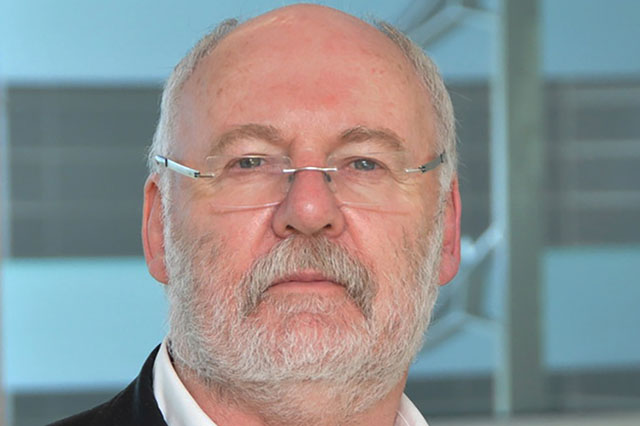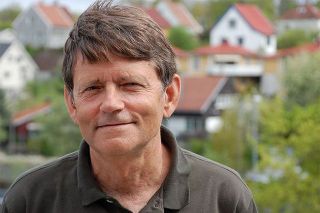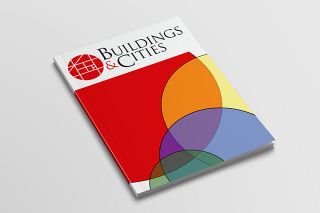
www.buildingsandcities.org/insights/news/ray-cole-awarded-the-order-canada.html
Ray Cole Awarded the Order of Canada

Professor Ray Cole, Associate Editor of Buildings & Cities, has recently been awarded the Order of Canada by the Governor General of Canada. Alex Zimmerman discusses Ray's work leading up to this award.
The Order of Canada is the country's highest civilian honour and is the centrepiece of Canada's honours system. The honour "recognises outstanding
achievement, dedication to the community and service to the nation". The Order
of Canada is highly regarded in Canadian society.
Over the past forty years, Cole has been a leading voice at the forefront of the global green buildings movement. He changed the landscape for how this topic is discussed and practiced. He consistently provided thought leadership and a rigorous intellectual foundation for the environmental and social/human performance of buildings. Cole's involvement in regenerative development has helped to reframe environmental interventions as positive, constructive contributions. Cole not only provided sound intellectual leadership, he also engaged with numerous public and private regional, national and international organisations to develop consensus for the implementation of these ideas.
Cole was instrumental in changing the Canadian conversation on buildings and the environment. He was the key instigator and author, in the early 1990s, of the Building Environmental Performance Assessment Criteria (BEPAC), which was not only a Canadian first, it extended building environmental assessment beyond energy, climate and water concerns to materials and health issues. He was co-founder of the Canadian-initiated Green Building Challenge series of international conferences which were the first to advance and define the concept of green holistic buildings. He did the foundational technical assessment work for the adaptation of the LEED green building rating system to Canada. He is held in high esteem by his Canadian colleagues, which was reflected both in his write-in election to Canada Green Building Council's Board of Directors and as the first recipient of the Council's Lifetime Leadership Award.
Cole also played a significant international role throughout his career, particularly on defining, testing, developing and articulating the conceptual frameworks and the accompanying set of principles and practices to create environmentally-advanced buildings. He provided fundamental thinking underpinning many green building assessment tools (BREEAM, LEED, CASBEE and others), which has influenced practices in North America, Hong Kong, Japan, Europe and other countries.
Cole's core activity prior to his retirement was teaching and it was one of his abiding passions.
As a teacher at University of British Columba (UBC), he taught and inspired countless architects in Canada to incorporate sustainability in their designs. Cole received four awards for teaching excellence and scholarship, including holding the designation of North American Association of Collegiate Schools of Architecture Distinguished Professor and UBC Distinguished University Scholar.
Cole constantly shared his knowledge and insights through many expert keynote presentations, including in Canada, US, UK, Hong Kong, Australia, New Zealand, Japan and South Korea, as well as several countries in Europe and around the globe. He served both architecture and the buildings industry by continually organizing and moderating thought-leading symposia and workshops, chairing and contributing to national and international committees, sitting on award juries and editorial and advisory boards.
His peers in the field have appreciated his accomplishments, bestowing nine awards and distinctions in recognition of his work, dedication and service, including Life-time Leadership Award from the Canada Green Building Council. The awarding of the Order of Canada shows that the wider Canadian society now also recognises his extraordinary achievements and contributions.
Latest Peer-Reviewed Journal Content
Urban verticalisation: typologies of high-rise development in Santiago
D Moreno-Alba, C Marmolejo-Duarte, M Vicuña del Río & C Aguirre-Núñez
A public theatre as a living lab to create resilience
A Apostu & M Drăghici
Reconstruction in post-war Rome: transnational flows and national identity
J Jiang
Reframing disaster recovery through spatial justice: an integrated framework
M A Gasseloğlu & J E Gonçalves
Tracking energy signatures of British homes from 2020 to 2025
C Hanmer, J Few, F Hollick, S Elam & T Oreszczyn
Spatial (in)justice shaping the home as a space of work
D Milián Bernal, J Laitinen, H Shevchenko, O Ivanova, S Pelsmakers & E Nisonen
Working at home: tactics to reappropriate the home
D Milián Bernal, S Pelsmakers, E Nisonen & J Vanhatalo
Living labs and building testing labs: enabling climate change adaptation
J Hugo & M Farhadian
Energy sufficiency, space temperature and public policy
J Morley
Living labs: a systematic review of success parameters and outcomes
J M Müller
Towards a universal framework for heat pump monitoring at scale
J Crawley, L Domoney, A O’Donovan, J Wingfield, C Dinu, O Kinnane, P O’Sullivan
Living knowledge labs: creating community and inclusive nature-based solutions
J L Fernández-Pacheco Sáez, I Rasskin-Gutman, N Martín-Bermúdez, A Pérez-Del-Campo
A living lab approach to co-designing climate adaptation strategies
M K Barati & S Bankaru-Swamy
Mediation roles and ecologies within resilience-focused urban living labs
N Antaki, D Petrescu, M Schalk, E Brandao, D Calciu & V Marin
Negotiating expertise in Nepal’s post-earthquake disaster reconstruction
K Rankin, M Suji, B Pandey, J Baniya, D V Hirslund, B Limbu, N Rawal & S Shneiderman
Designing for pro-environmental behaviour change: the aspiration–reality gap
J Simpson & J Uttley
Lifetimes of demolished buildings in US and European cities
J Berglund-Brown, I Dobie, J Hewitt, C De Wolf & J Ochsendorf
Expanding the framework of urban living labs using grassroots methods
T Ahmed, I Delsante & L Migliavacca
Youth engagement in urban living labs: tools, methods and pedagogies
N Charalambous, C Panayi, C Mady, T Augustinčić & D Berc
Co-creating urban transformation: a stakeholder analysis for Germany’s heat transition
P Heger, C Bieber, M Hendawy & A Shooshtari
Placemaking living lab: creating resilient social and spatial infrastructures
M Dodd, N Madabhushi & R Lees
Church pipe organs: historical tuning records as indoor environmental evidence
B Bingley, A Knight & Y Xing
A framework for 1.5°C-aligned GHG budgets in architecture
G Betti, I Spaar, D Bachmann, A Jerosch-Herold, E Kühner, R Yang, K Avhad & S Sinning
Net zero retrofit of the building stock [editorial]
D Godoy-Shimizu & P Steadman
Co-learning in living labs: nurturing civic agency and resilience
A Belfield
The importance of multi-roles and code-switching in living labs
H Noller & A Tarik
Researchers’ shifting roles in living labs for knowledge co-production
C-C Dobre & G Faldi
Increasing civic resilience in urban living labs: city authorities’ roles
E Alatalo, M Laine & M Kyrönviita
Co-curation as civic practice in community engagement
Z Li, M Sunikka-Blank, R Purohit & F Samuel
Preserving buildings: emission reductions from circular economy strategies in Austria
N Alaux, V Kulmer, J Vogel & A Passer
Urban living labs: relationality between institutions and local circularity
P Palo, M Adelfio, J Lundin & E Brandão
Living labs: epistemic modelling, temporariness and land value
J Clossick, T Khonsari & U Steven
Co-creating interventions to prevent mosquito-borne disease transmission in hospitals
O Sloan Wood, E Lupenza, D M Agnello, J B Knudsen, M Msellem, K L Schiøler & F Saleh
Circularity at the neighbourhood scale: co-creative living lab lessons
J Honsa, A Versele, T Van de Kerckhove & C Piccardo
Positive energy districts and energy communities: how living labs create value
E Malakhatka, O Shafqat, A Sandoff & L Thuvander
Built environment governance and professionalism: the end of laissez-faire (again)
S Foxell
Co-creating justice in housing energy transitions through energy living labs
D Ricci, C Leiwakabessy, S van Wieringen, P de Koning & T Konstantinou
HVAC characterisation of existing Canadian buildings for decarbonisation retrofit identification
J Adebisi & J J McArthur
Simulation and the building performance gap [editorial]
M Donn
Developing criteria for effective building-sector commitments in nationally determined contributions
P Graham, K McFarlane & M Taheri
Join Our Community

The most important part of any journal is our people – readers, authors, reviewers, editorial board members and editors. You are cordially invited to join our community by joining our mailing list. We send out occasional emails about the journal – calls for papers, special issues, events and more.
We will not share your email with third parties. Read more



Latest Commentaries
COP30 Report
Matti Kuittinen (Aalto University) reflects on his experience of attending the 2025 UN Conference of the Parties in Belém, Brazil. The roadmaps and commitments failed to deliver the objectives of the 2025 Paris Agreement. However, 2 countries - Japan and Senegal - announced they are creating roadmaps to decarbonise their buildings. An international group of government ministers put housing on the agenda - specifying the need for reduced carbon and energy use along with affordability, quality and climate resilience.
Building-Related Research: New Context, New Challenges
Raymond J. Cole (University of British Columbia) reflects on the key challenges raised in the 34 commissioned essays for Buildings & Cities 5th anniversary. Not only are key research issues identified, but the consequences of changing contexts for conducting research and tailoring its influence on society are highlighted as key areas of action.